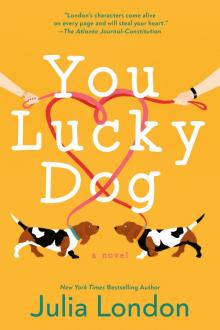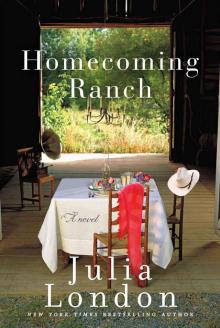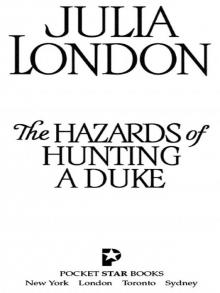- Home
- Julia London
Homecoming Ranch Page 2
Homecoming Ranch Read online
Page 2
“Why’d this guy come all the way to tell you?” Mom asked. “Why didn’t he send a letter or something?”
“Because my father left me something, Mom. He left me a ranch.”
“A what? What do you mean a ranch? A real ranch?”
“A real ranch,” Madeline confirmed. Just saying it out loud made her feel strangely annoyed. She ought to be, as Jackson Crane had pointed out, excited by the prospect. But she wasn’t.
“What about me?” her mother asked.
“What do you mean?” Madeline asked, confused.
“I mean, did he leave me anything?”
Madeline didn’t even know what to say to that. Why would she think he had? “I don’t—”
“What about all the child support he should have paid me? I ought to go after that.”
Madeline was not surprised that her mother would turn news like this around to herself. “Mom… no offense, but you probably should have gone after that when you actually supported me. I’m almost thirty. I’ve been on my own since I was seventeen.”
“Well,” her mother said with a sniff, “when you go, ask about that. I feel like he should have left me something.”
Go? Go where? A big, heavy wrench had just been tossed into the middle of Madeline’s neatly ordered life. She had the DiNapoli listing, a fifteen-thousand-square-foot monstrosity of Greek revival meets Jersey Shore. It was a huge challenge to sell, but one that would pay off in a major way when it did. Eight months ago, Madeline’s fellow realtors had told her not to take it, that the sellers were unreasonable, that they wouldn’t come down off the asking price. But Madeline was determined. She’d spent a lot of time and money to market that property—a lot—and she wasn’t going to leave that hanging. Plus, she’d committed to another eight weeks of soccer, and neither was she going to leave those little girls without a coach. Camp Haven had saved Madeline from a bad situation one summer by daily removing her from her mother’s dysfunctional orbit. She was indebted to them. Coaching made her feel useful. She didn’t have time for a father she never knew popping up, uninvited, unwanted, into her life.
“Honestly, I never thought he was a ranch kind of guy,” her mother said, and at the same time, Madeline heard the faint, but unmistakable tone of a male voice in the background. “Well, listen, kiddo, I’ve got to get going—”
“Wait, Mom! There’s more,” Madeline said quickly. “That’s not all he left me.”
“Oh yeah? What else?”
“Two sisters.”
Her mother took a long drag off her smoke and blew it into the receiver. “I guess that doesn’t come as a big surprise. Look on the bright side—you’ve always wanted siblings.”
It was true that Madeline had always wanted siblings. Brothers, sisters, she didn’t care, just someone to be there when she came home from school. Someone who would make Pop-Tarts and watch TV with her until Mom dragged in from wherever she’d been that day. To think that all this time, Madeline had had not one, but two sisters was a lot to absorb. She imagined an entire life of barbeques and ski trips and father-daughter dances that had not included her.
“I’ll be just a minute!” her mother suddenly shouted, startling Madeline, and then said, “You look like him, you know it?”
“Who?”
“Your father! Those blue eyes and that dark brown hair. Let me tell you, thirty years ago, Grant Tyler was one good-looking bastard. We sure sowed some wild oats.” She laughed, but it dissolved into a phlegm-filled cough. “We discovered our sexuality together.”
“Mom!” Madeline exclaimed. “Don’t even. It’s not like you guys were hanging out at Woodstock.”
“You think Woodstock was the only sexual revolution in this country?”
“I am so not having this conversation with you.”
“You know what your problem is?” Mom continued, ignoring her. “You’re too uptight. You like things to fit in neat little boxes and go certain ways and they never do.”
“Oh, I know, Mom. You taught me that things weren’t going to go my way,” Madeline said with a twinge of bitterness.
“Don’t start with me, Madeline. I did the best I could. Now when are you going to go and check out this ranch?”
“I’m not.”
That gave her mother a slight bit of pause. “What do you mean, you’re not?”
“I don’t want to go. I don’t want anything from him. I don’t want a ranch and two sisters I never knew I had until today, and the only reason I know about them at all is because he must have felt guilty on his deathbed. I have way too much going on right now. I just listed the DiNapoli house. I’m coaching a new team. I’m really busy.”
“John, goddammit, I am on the phone with my daughter! I said I’d be there in a minute!” her mother shouted. “I swear, the things I have to put up with. I have to go, Madeline. We’ll talk later. But you think about what you just said. Because I think you want to understand more about the man who gave you life. And you need to go see what we got.”
Madeline had wanted to understand more about her father a very long time ago. And when the answers didn’t come, she’d stopped caring. How could her mother not realize that? “No, Mom. I don’t care who he was, and I don’t want anything of his.” There was, Madeline had realized with surprise, so much resentment in her voice. So much.
She’d expected her mother to argue, but in a rare moment of maternal instinct, Clarissa Pruett sighed. “He cared about you, Maddie. He loved you. But he was a weak man. Now I really have to go. I need some help with my car payment this month and it’s best to keep Big John happy.” She hung up.
“I’m not going,” Madeline said into the dead line. And she meant it.
She had no intention of uprooting her carefully constructed life, of dropping everything to fly out to Colorado.
Trudi was not satisfied with Madeline’s response either. “Don’t be stupid,” she said when they met up.
Madeline had known Trudi since the first grade. They’d met in Mrs. Bever’s class—Madeline, the skinny, dark-haired, dirty kid who was always late because her mother couldn’t wake up after a night of partying. And Trudi, the overweight, red-cheeked redhead with sparkling green eyes. They were outsiders, the kids on the fringe. But as they grew older, Trudi’s personality far outshone her weight, and she became friend to all and enemy to none. She’d still experienced crushing moments—mean boys, meaner girls—but Madeline was always there, on her side.
And Trudi had been steadfastly loyal to Madeline in return.
Madeline used to envy Trudi. She’d had the home life Madeline had always craved: a real house, a mother and a father and a sister and a brother. Her mother got her up in the morning and fed her breakfast, and she was there when Trudi came home from school. She washed Trudi’s clothes and helped her with her homework and took her shopping and went to all her school events and made cookies for the class.
Madeline and her mother had lived hand-to-mouth most of her life, putting down roots with whomever would take them in, living off the men her mother met, and then, whenever her mother was offended, which had been often, pulling up from their shallow moorings and blowing away. Mom had held a dozen jobs or more, had relied heavily on her blue-collar parents long after it was decent to do so, and had bristled when Madeline would beg for a house like Trudi’s.
Well, Mom finally had the house. She’d inherited it when her parents had died, long after Madeline had left home determined to make a life completely different than the one her mother had shown her.
“You have to go.” Trudi peeled a nacho from an enormous plate of them. “I am not going to let you sit there like a geeky bump on a log with your highlighters and flat shoes and miss this opportunity.” She tucked the guacamole-laden chip into her mouth.
“What’s wrong with my shoes?” Madeline asked. They were ballet flats, purchased on sale from Kohl’s.
“I’ve told you before, Mad,” Trudi said in that patient, motherly voice usually reserved for her
daughter, Esme, or her husband, Rick, “there is practical, and then there is too practical. Anyway, we’re not talking about your shoes, we are talking about you and the little bubble you live in, and your unwillingness to step outside of that bubble.”
“I don’t know what you mean,” Madeline sniffed. “I have too stepped out of my bubble.” She ignored the nagging thought that she had turned off her cell phone so that she would not receive messages from anyone who could possibly pull her out of her bubble.
“Oh, really?” Trudi asked, and looked up slyly from her chip. She didn’t come out and say it, but she was talking about Stephen, a man Madeline had dated a few times. Trudi’s husband had introduced them. Stephen was a lawyer, a successful guy who could drape himself over a chair and look at you in a way that would make you melt inside. He was fun, he was respectful… but then he’d gone and ruined it all a couple of weeks ago when he’d said he wanted to take things “to the next level.” That sounded vaguely like a video game to Madeline, and it made her uncomfortable. Since then, she’d been sort of dodging Stephen. She had her breakup speech all worked out. There was no sound reason for her reluctance. Madeline was acutely aware that a mature person did not stop dating another mature person because of one little thing he’d said. It didn’t make sense, she got that. But she did not want to go to the next level.
“By the way,” Trudi said, “Stephen asked me to tell you that he has your movie guide.”
Shit. Madeline needed her movie guide; she was a film buff. She and movies had a standing Friday night date, right after soccer. “I know he does, Trudi,” she lied. “I’m going to pick it up tomorrow.”
“Tomorrow?”
“Tomorrow.”
“I hope so, because Stephen is hot, he’s a great guy, and he really likes you. He told me.”
Madeline did not believe that men really liked her. She believed Stephen said he did because he thought he was supposed to say it, or had said it to other women and scored with it. “Come on, Trudi,” she scoffed. “I’m a control freak, my condo is so neat that it’s a little obsessive—you yourself have said so many times—and I work all the time. How can he like me so much? He doesn’t even know me that well.”
“How can you say that? He knows you’re pretty and funny and when he figures out how insanely organized you are, he might actually see it as a benefit. Not everyone is as annoyed by it as I am.”
Madeline snorted and reached for a nacho.
“For someone so smart, you can be really dumb sometimes, you know it?” Trudi pointed a chip at Madeline. “You know what’s going on here, don’t you? The reason you don’t believe Stephen could really dig someone like you is because you have so many daddy issues you’re like a walking Lifetime movie. Which is all the more reason you have to go to Colorado and clear this up.”
Madeline laughed. “It has nothing to do with my dad. Please.” But she wasn’t certain that was entirely true.
“This is textbook Dear Abby,” Trudi said with a wave of her pudgy fingers. “Your father abandoned you and now you don’t believe a guy would have deep feelings for you. Hello! Just go, Mad. Go and do yourself a favor and answer all the questions your ten-year-old self had. How can that be a bad thing?” She’d swatted Madeline’s hand away from her nachos. “So what’s it called, this ranch?” Trudi asked as she signaled the waiter and made a gesture to their empty margarita glasses.
“Homecoming Ranch.” When Jackson Crane had told her the name, Madeline had laughed. A high-pitched, nervous laugh. She’d said, this is a joke, and he’d said, no joke. And as Madeline had tried to take it in, to absorb such stunning news, Jackson Crane told her the Colorado ranch was about six hundred acres. Madeline the realtor had done some quick math in her head and had almost swooned with the possibilities.
“Wow,” Trudi said approvingly. “Sounds like a place I’d like to visit. Another reason you have to go.”
“It sounds to me like a place where Sperm Donor wore a ten-gallon hat and rode around on a big black horse while my mom hopped from one tract house to another.”
“Could be some money in it,” Trudi said, and wiggled her eyebrows. “Have you thought of that?”
“I don’t want anything from him, Trudi. I mean, seriously, can you blame me?”
“No,” Trudi said flatly. “But…”
“But what?”
Trudi frowned. She pushed aside her plate, planted her forearms on the table, and leaned across the table. “Okay, look, I wasn’t going to bring this up,” she said low. “But do you remember the box you kept under your bed in the fifth grade?”
Madeline could sense one of Trudi’s “teachable moments” coming on. She glanced at the waitress, wished she’d hurry with the margaritas.
“You know, the one with the magazine cutouts?” Trudi pressed.
Something crawled up Madeline’s spine. Yes, she remembered. She’d been ten years old then. She’d sit at the scarred Formica table in her grandmother’s house with scissors and magazines, and cut out pictures of houses behind white picket fences, of families with cars and dogs and beach balls. There were always beach balls in those pictures. She’d cut out pictures of women with babies, of children on Slip ’N Slides, of happy, smiling people. She’d made up the life that she’d wanted so desperately and had saved those pictures in a shoebox under her bed.
“How in God’s name to do you remember stuff like that?” Madeline asked.
“How could I forget something like that? So here’s the thing—I remember that skinny kid with the freckles and the blue eyes and those horrible tie-dyed Keds, and I think she deserves to know why her stupid-ass dad wasn’t around. Mad, you have to go. For that ten year-old kid.”
Her ten-year-old self was a compelling argument, but it still didn’t change Madeline’s mind. But what did change her mind a few days later was soccer practice with a wiggling group of five-year-olds.
At the end of their practice—which consisted of a lot of running around and giggling about bouncing soccer balls—eight girls sat in a circle under a tree with Madeline and Teresa, the other volunteer coach. Teresa’s husband generally attended, too, but that afternoon he’d been one of the volunteers dispatched to take two girls home.
The girls were drinking CapriSuns and eating apple slices that Madeline had brought. This was Madeline’s favorite part of her day, her week, her month. She had been one of these girls once; she had sat under this tree, had wished that any of the coaches would be her new mom or dad. Madeline could not forget the yearning she’d felt then.
As a coach, she’d made up a game to play with the girls. They called it the Wishing Game, and they took turns announcing what they wished for. Madeline started the game that afternoon. “I wish, I wish, I wish,” she said, pausing for dramatic effect, “that I had a pet unicorn!”
The girls squealed with delight, and around they went. Mostly, the girls wished for things: a Wii, a television. One wished her mom had a car. Another wished she lived in a castle with lots of cats. Another wished to be a princess with a Barbie car.
But Kenya had a different sort of wish. “I wish, I wish, I wish I was a boy.”
Madeline and Teresa looked at each other. “A boy?” Madeline asked, smiling.
“Yep. If I’m a boy, my daddy will come home.”
“Why do you have to be a boy for your daddy to come home, honey?” Teresa asked.
“I don’t know,” Kenya said. “Mommy said if I was a boy, he’d come home.” She said it as if it were perfectly natural for a mother to tell her young daughter that she was the wrong sex, that her gender was the reason her father was missing from her life.
Two girls sitting next to Kenya dissolved into giggles. “Your daddy ain’t coming home.”
“Yes he is,” Kenya said with the full confidence of a five-year-old. “He can’t come home right now because he’s a superhero. He’s fighting bad guys.”
The girls giggled, and Kenya looked to Madeline for support. “He’s friends with
Batman,” she said, and the girls laughed again.
How could Madeline deny that child? How many times had she wished for a superhero dad? “I know,” she said, smiling at Kenya. “I saw him.”
Kenya’s eyes rounded. “You saw my daddy?”
“With Batman,” Madeline said. She could feel Teresa’s frown of disapproval, could see the other girls staring at her with excitement. But that all faded in the light of Kenya’s big grin.
So in the end, in a roundabout way, it was Kenya who made Trudi’s argument for Trudi. Kenya deserved a better explanation of why her father was missing from her life. So did Madeline.
Later that night, when Stephen called, Madeline settled on the perfect excuse to end things with him: She told him she couldn’t date him right now, because she was going to take care of some personal business.
“What kind of personal business?” he asked.
“My father died and left me some property in Colorado,” she said. “Shared with siblings I haven’t met.” She gave him a brief explanation of what she knew.
“Wow,” Stephen said. “You know, I have a friend in Denver who handles property cases. I could get in touch.”
Madeline agreed to it if for no other reason than to end the call. She guessed a lawyer in Denver would probably tell her what Jackson Crane had already told her.
Over the next two days, she arranged everything at work. She made color-coded files with all her listings, prepared task charts for the realtor’s assistant, Bree, to follow in case something should come up in the few days she was gone. She even prepared some automated e-mail reminders on the slim chance that her plane went down. She’d left explicit instructions for when and how the office was to contact her, and, please God, if she got an offer on the DiNapoli property, how they were to text her immediately.

 A Royal Kiss & Tell
A Royal Kiss & Tell You Lucky Dog
You Lucky Dog The Devil in the Saddle
The Devil in the Saddle The Trouble with Honor
The Trouble with Honor Tempting the Laird
Tempting the Laird The Secret Lover
The Secret Lover A Light at Winter’s End
A Light at Winter’s End The Charmer in Chaps
The Charmer in Chaps Homecoming Ranch
Homecoming Ranch Jack (7 Brides for 7 Soldiers Book 5)
Jack (7 Brides for 7 Soldiers Book 5) A Courtesan's Scandal
A Courtesan's Scandal Hard-Hearted Highlander--A Historical Romance Novel
Hard-Hearted Highlander--A Historical Romance Novel The Complete Novels of the Lear Sister Trilogy
The Complete Novels of the Lear Sister Trilogy The Last Debutante
The Last Debutante Suddenly Single (A Lake Haven Novel Book 4)
Suddenly Single (A Lake Haven Novel Book 4) Seduced by a Scot
Seduced by a Scot Highlander Unbound
Highlander Unbound Suddenly Dating (A Lake Haven Novel Book 2)
Suddenly Dating (A Lake Haven Novel Book 2) The Bridesmaid
The Bridesmaid The Seduction of Lady X
The Seduction of Lady X One Mad Night
One Mad Night Extreme Bachelor
Extreme Bachelor The Scoundrel and the Debutante
The Scoundrel and the Debutante The Revenge of Lord Eberlin
The Revenge of Lord Eberlin American Diva
American Diva The Lovers: A Ghost Story
The Lovers: A Ghost Story The Hazards of Hunting a Duke
The Hazards of Hunting a Duke Return to Homecoming Ranch (Pine River)
Return to Homecoming Ranch (Pine River) The Perils of Pursuing a Prince
The Perils of Pursuing a Prince Highlander in Love
Highlander in Love The Devil Takes a Bride
The Devil Takes a Bride Devil in Tartan
Devil in Tartan Wild Wicked Scot
Wild Wicked Scot Snowy Night with a Highlander
Snowy Night with a Highlander One Season of Sunshine
One Season of Sunshine Summer of Two Wishes
Summer of Two Wishes All I Need Is You aka Wedding Survivor
All I Need Is You aka Wedding Survivor Sinful Scottish Laird--A Historical Romance Novel
Sinful Scottish Laird--A Historical Romance Novel Suddenly Engaged (A Lake Haven Novel Book 3)
Suddenly Engaged (A Lake Haven Novel Book 3) Highlander in Disguise
Highlander in Disguise Suddenly in Love (Lake Haven#1)
Suddenly in Love (Lake Haven#1)